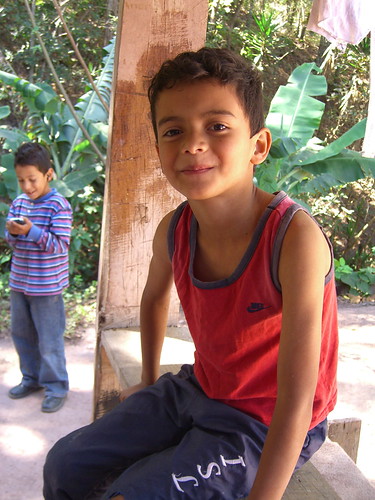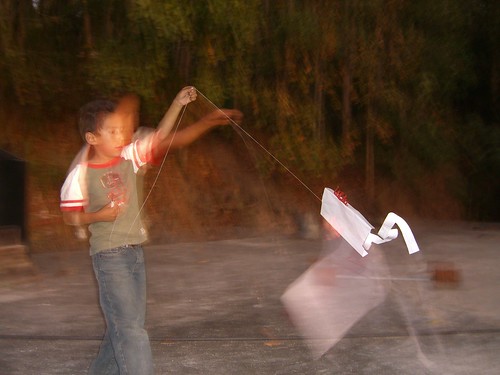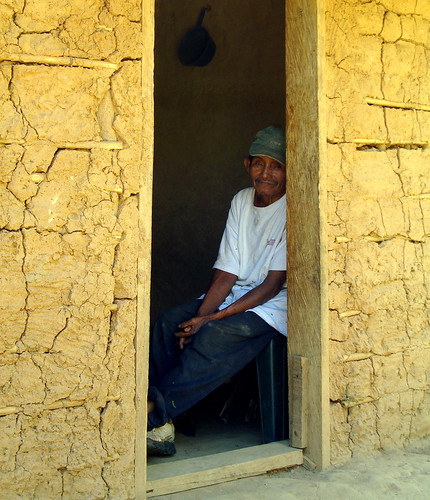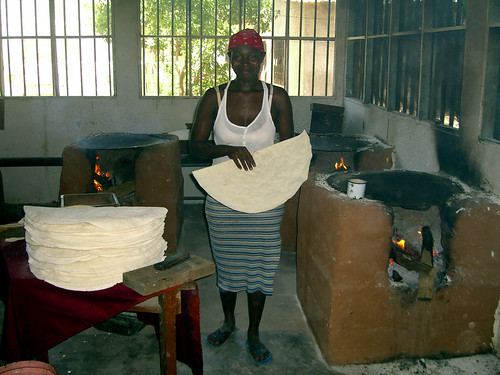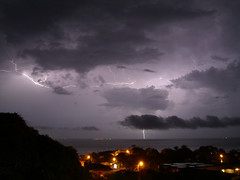There have been rumors for some time that the Peace Corps is facing a bit of a budget crunch, but until recently I couldn't find any official mention of a budget shortfalls by Peace Corps officials. The Washington Post recently ran an article detailing the budget crisis.
See also:
- Peace Corps is closing it's Minneapolis recruiting office. Congresswoman Betty McCollum (D-MN) has written a letter to the Director of Peace Corps, Ron Tschetter, asking him to reconsider.
- The Denver recruiting office is also slated to close. The Denver office handles recruiting for five states: Colorado, Wyoming, Nebraska, Utah and Kansas.
- The Peace Corps is closing several smaller posts, including Kiribati.
The consequences of the budget crisis have been felt by PCVs in Honduras. Our living allowances have remained unchanged over the past two years, despite price increases of 20-50% for food and transportation.
Of course, we can manage without getting the extra living allowance. However, Peace Corps is cutting the number of volunteers, closing posts and closing recruiting offices. In order to save costs on training, Peace Corps Volunteers who wish to extend their service are limited to countries where they already speak the language (so Honduras PCVs can no longer extend to Africa, Asia or Eastern Europe). All of these changes result in fewer "boots on the ground." Despite the challenges we face in our communities, I am convinced that Peace Corps Volunteers make a difference at the very least by fomenting understanding and goodwill between the USA and other countries. Fewer volunteers means less goodwill, and the USA doesn't have much of that to sacrifice these days.
Please encourage your senators and congressperson to fully fund Peace Corps.
UPDATE: Erica Burman of the National Peace Corps Association directs us to the MorePeaceCorps campaign, which is advocating for a reinvigorated (and fully funded) Peace Corps.
Thursday, August 28, 2008
Peace Corps Budget Issues?
Posted by
Raphael
at
2:00 PM
6
comments
![]()
Sunday, August 10, 2008
Peace Corps Georgia
 The Third Goal of the Peace Corps is "To help promote a better understanding of other peoples on the part of Americans." So even though this has nothing to do with Honduras, I figure it's worth posting.
The Third Goal of the Peace Corps is "To help promote a better understanding of other peoples on the part of Americans." So even though this has nothing to do with Honduras, I figure it's worth posting.
I've been following the news of the escalating conflict in Georgia for the last couple days, and it finally hit me today: is there Peace Corps in Georgia?
There is. There is also a directory of Peace Corps Georgia Volunteer blogs. Understandably, not many of the blogs have been updated since the fighting began (PCVs have been consolidated to a town near the Armenian border, and may be evacuated to Armenia if the fighting continues.) But there have been some blog entries that provide a personal, and emotional, perspective on what's happening:
"Gori, where Brenden and I lived last summer, was hit by seven more bombs today (there were six yesterday), and the neighborhood of Kombinati (our neighborhood) was particularly hard hit. The bridge between Kombinati and the rest of the Gori is apparently damaged, so the main east-west highway is closed down..." - B & C Go To Georgia
"for those of you looking for updated news, as always, I recommend www.civil.ge and www.alertnet.org" - Cuttino's Blog
"Imagine moving from your home and two weeks after you've left, you're seeing images of the neighborhoods being bombed and buildings that have caught on fire." - Ian MySpace Blog
One of the unsung benefits of Peace Corps is that it creates a network of americans living abroad at the community level. Combined with the Internet, this is a powerful tool for sharing information and perspectives that don't always make the front pages.
Posted by
Raphael
at
7:23 PM
0
comments
![]()
Saturday, August 9, 2008
MSM and Funding for HIV/AIDS Prevention
 The XVII International AIDS Conference ended yesterday in Mexico City. Two leaders from the support group here in Trujillo received funding to attend the conference, and I'm looking forward to hearing all about it from them. In the meantime, an AP article today brought up some issues that are very relevant to combating HIV/AIDS here in Honduras.
The XVII International AIDS Conference ended yesterday in Mexico City. Two leaders from the support group here in Trujillo received funding to attend the conference, and I'm looking forward to hearing all about it from them. In the meantime, an AP article today brought up some issues that are very relevant to combating HIV/AIDS here in Honduras.
In "Global AIDS prevention gives short shrift to gays" reporter Julie Watson writes that "less than 1 percent of the $669 million reported in global prevention spending targets men who have sex with men."
This is despite the fact that "new HIV infections among gay and bisexual men in many countries are rising at alarming rates," and that in many countries the infection rate among men who have sex with men (MSM) is double or triple that of the general population.
In many developing countries, homosexuality is taboo or even illegal. In some places it is punishable by death. Some countries (like Iran) deny that homosexuality even exists. This kind of eyes-closed-and-fingers-in-the-ears denial of reality makes it impossible for public health professionals and institutions to spend prevention resources on one of the populations that most urgently needs it. On top of that, discrimination drives gay and bisexual men underground, making it extremely hard for health workers to reach them.
Ms. Watson goes on to write:
Complicating matters is that in countries from Latin America to Southeast Asia, many men who have sex with men, insist they are not gay. More than 30 percent of Latin American men who reported having sex with men said they also had unprotected sex with women, according to UNAIDS. Many are married.
This is exactly true for Honduras. According to official statistics, nearly 85% of new HIV infections were transmitted through heterosexual contact. In reality, these numbers are almost certainly untrue.
One problem is how the statistics are gathered (when they're gathered at all, which is another huge problem). A person who goes to get tested at a public hospital or health center must fill out a form in which they are asked to state their sexual orientation. This form is filled out in front of the health worker (who is often someone from the same community). Although confidentiality is required by law, it is never practiced. Anyone identifying themselves as gay or bisexual on one of these forms would basically be coming out to their entire community by doing so.
Also, many men who have sex with men never self-identify as homosexual or bisexual. According to machista culture, you're not gay if you're on top, or if you're really drunk. As is stated in the article, most men are married and in many cases don't find out about their own HIV infection until their wives become pregnant and are tested for HIV as part of their prenatal care.
I'd like to say that I know of organizations here that specifically reach out to MSM, but I can't. I'd bet there are some in the larger cities, where homosexuality is more accepted. But in smaller cities and towns, there's nothing. I'm sure that some of the NGOs and GOs that do HIV/AIDS prevention would like to work with MSM, but because it is still so stigmatized here, it's very difficult to reach the population that doesn't want to be discovered.
The article touches upon some strategies for combating HIV among MSM populations. To navigate stigma and taboos, health workers can use sensitive or even coded language in order to ask about homosexual contact without scaring people away. Surveys that quantify infection rates among MSM can help convince public health authorities that action needs to be taken. But most importantly, the stigma and taboos need to be broken down - through education, advocacy and the examples set by those who are willing to go public about their HIV status and their sexuality. We in the support group have focused more on combating the stigma of HIV infection, since on the north coast homosexuality is less stigmatized than in other parts of the country. But I think the support group members who are open about their status and their sexuality have done more to reduce stigma than any public education campaign we might do.
Posted by
Raphael
at
3:56 PM
0
comments
![]()
Friday, August 8, 2008
Help me pick the photos, win a calendar!
Hey folks, some of you may know that the RPCV Madison group puts out a great Peace Corps Calendar every year that features photos submitted by PCVs. They accept up to five photo submissions from each PCV for the calendar. I've gathered some of my best photos and would like you to tell me which five I should submit!
If one of my photos is accepted then I will receive 25 free calendars. Of those, I will give away up to 15 calendars with readers who voted on which pictures to submit! So please look through the following pictures, then add a comment saying which ones you like best (vote for up to five). To get an idea of the kind of photos that get published, you can peruse the winning photos for the 2008 and 2007 calendars.
Thanks for helping me out!
#1) Jairo Smiling:
#2) Oscarito Flying his Kite:
#3) Flips into the Ocean:
#4) Fisherman in the early AM:
#5) Boys Fishing (wide shot):
#6) Pech Family:
#7) Washing by Hand:
#8) Pech man in Doorway:
#9) Pech man on Chair:
#10) Making Casabe:
Posted by
Raphael
at
11:22 AM
7
comments
![]()
Lightning over the Bay of Trujillo
Also, in other random news, the Democratic Party added expansion of Peace Corps to it's draft platform. This should not be construed as an endorsement of the party or as a political statement, it's just news I thought I'd share.
To be "fair and balanced," President Bush did pledge to double the Peace Corps in 2002, resulting in a jump in applications.
Posted by
Raphael
at
10:42 AM
0
comments
![]()




